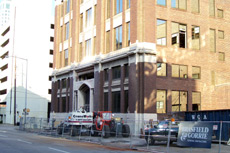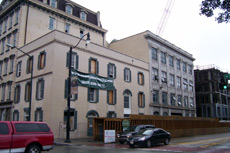Editor’s Note: I received the following letter from Jeremy C. Erdreich this afternoon. Erdreich is the principal of Erdreich Architecture, PC. It was written in response to this post on our city’s urban fabric. If anyone else has comments on the post, either comment directly to the post or submit your letter to andre@bhamterminal.com. – ACN
André,
Great job with The Terminal. I peruse it daily, as do friends of mine.
I want to commend you particularly on your editorial regarding the city’s attitude towards its history and its sense of urban place. As you know, we’ve always had a weak sense of the public, of the collective, and of urbanity here. I am very disheartened by the destruction of the Birmingham News building – as much about the lack of debate of other options as the actual demolition.
I witnessed a similar demolition request at Design Review this morning for the Parliament House Hotel on 20th Street. The committee focused only on how the parking deck’s alley face would be patched once the connector to the hotel was removed. The loss of the building itself was never addressed in discussion. Only at the very end did [design review committee] chair Sam Frazier say something like “You know, this is actually an historic building. Doris Day stayed here; President Nixon slept here. Is this building defined as historic?” He posed the question to Karla Calvert, the city historic officer, who demurred: “I’m not sure; I don’t think so.” Sam asked her for a yes or a no, but she would not give one. So he gave up, the demolition passed, and in a few years the city’s best example of late “Miami Beach” Modern will ostensibly be replaced by a mediocre, boxy, red brick UAB building of some sort or another.
History is subjective, and what we define as “historic” is subjective. But is was just sad that whether in the case of the News, or the Parliament House, there are only a few lone voices speaking out, if at all, and no movement to at least hold owners and developers more accountable to the community for their plans.
Again, thanks for your enlightened editorial.
Jeremy









Election '07: Improved transit should be a no-brainer
It appears that transit is about to become a top priority of the Jefferson County Commission. Probably about the time this post appears online a meeting will either have just finished or still be going on with hopes of beginning the discussion about a truly regional mass transit system for grater Birmingham.
The three commissioners that attended this year’s Regional Chamber of Commerce BIG trip returned with visions of bringing regional cooperation to the forefront of economic development efforts here in Birmingham. This is while the governor speaks about introducing more toll roads into the state to handle the increasing traffic on the state’s busiest roads, including Highway 280.
There are some that believe that Commissioners Carns and Humphreys and Commission President Collins are sincere, yet some are also cynical about their chances of success. They have every reason to think that way. If the issue becomes one of partisan politics instead of one about improving the quality of life not just for the Birmingham region, but for the entire state, then it will certainly see a steep uphill battle. If it is brought to the people of the entire state for a vote as being only about Birmingham and not as an opportunity to demonstrate what can happen in the entire state, it will fail to be approved.
As the regional population ages and transplants and “boomerangs” move into our metropolitan area, the issue of reliable transit will become more and more important and relevant. The mayor and council at the center of the region have good intentions about how to assist our transit authority, though it appears that any true progress in providing temporary support to a transit system in need will now have to wait until it is determined who will be in a runoff for the city’s top job.
Those that agreed to be interviewed for our Your Questions, Their Answers series all agreed that Montgomery did not necessarily understand the importance of this issue to the people of metro Birmingham and the state in general. They all agreed that the mayor should take a larger role in advancing the issue. Whoever gets elected should find ways to work with the commission and keep them motivated to follow through on their commitment to moving the region forward.
For a city that used to boast one of the world’s larger streetcar systems, it should be a no-brainer to return to a reliance of alternative transportation options. Gas prices continue to climb and many are realizing that the commute time could be just a little more productive than it is now if they weren’t having to drive so much. But we do dare defend our rights, particularly against the issue of more taxation. Unfortunately, better quality will not come about in this case until we realize that we cannot more if we are not willing to pay more for it.
This may finally be the time when we stop being provincial in terms of selfishness and with regards to the thought of failure and we take advantage of this opportunity to demonstrate how something like a regional or even statewide transit system can help us bring more jobs into the state and allow more of our residents and visitors to enjoy what the state has to offer.
I’ve learned in my short time living here that the words taxes and transit should not be spoken depending on where you are. People need to use those words with frequency if this city is to regain the infrastructure needed to truly enjoy its urban fabric.
Leave a comment
Posted in Alabama, Birmingham, Commentary, Election '07, regional